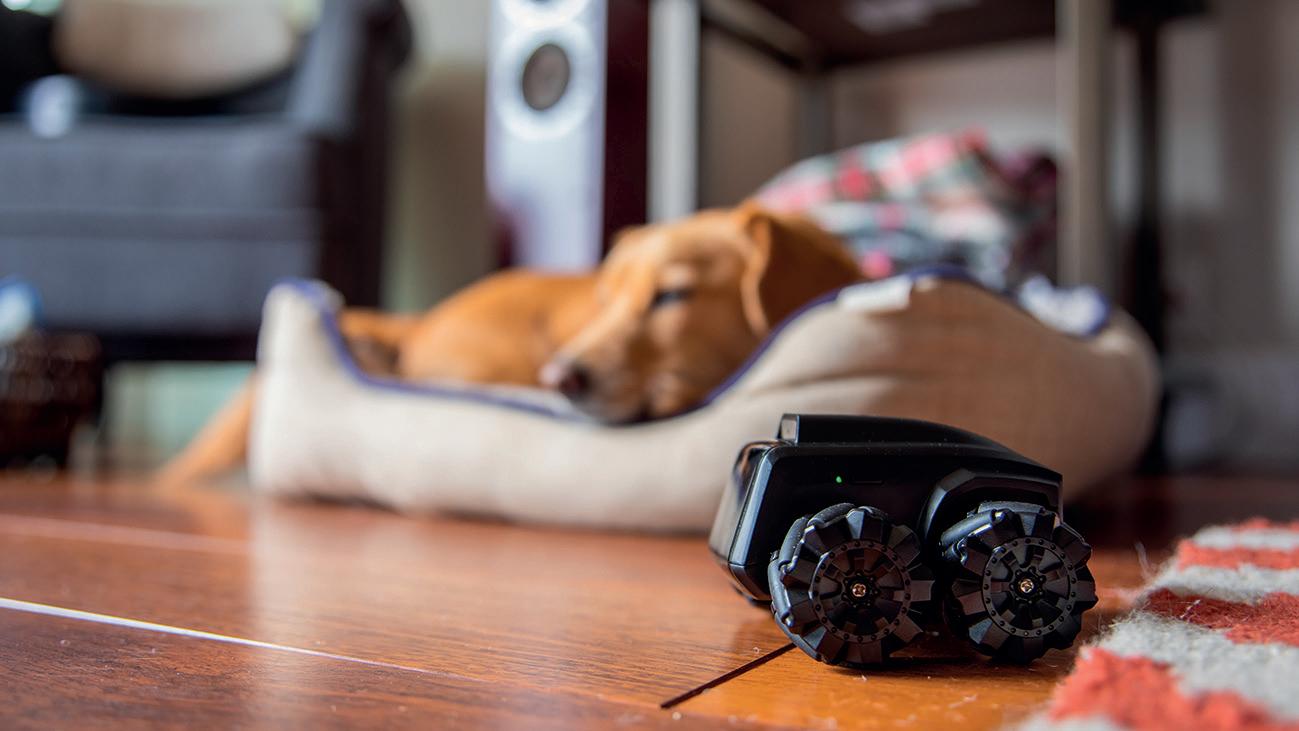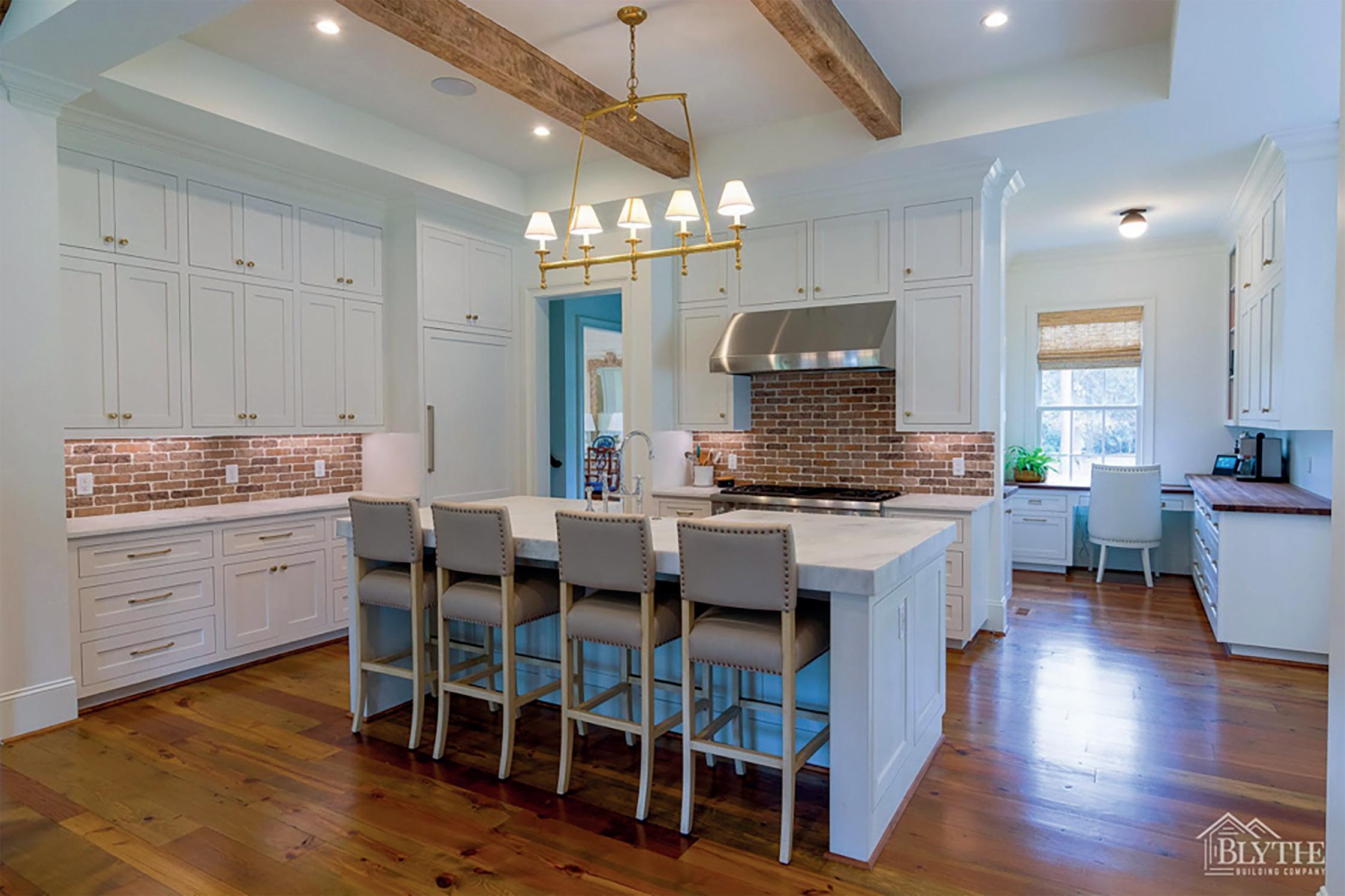
5 minute read
NEWS
Home patrol
Moorebot, the maker of cool robot applications like the ZEUS fighting robot, has revealed its new Scout robot on Kickstarter. “The Moorebot Scout is an autonomous AI robot that lets you monitor, discover and explore the world around you,” says Jun Ye, CEO at Moorebot at Pilot Labs. “Scout’s applications range from an intelligent mobile home camera, a pet companion, a surveillance tool for handyman, and an inspiring, modern learning platform for STEM education.”
Moorebot’s capabilities include Smart Home integration with either Amazon Alexa or Google Home, monocular SLAM (Simultaneous Localization and Mapping), and audio and visual intelligence that enables Scout to recognize, follow and interact with individual persons and pets.
Because of its small size (70mm x 100mm x 110mm - 2.8inches x 4 inches x 4.3 inches ) Scout can be used to autonomously monitor a home, office or business, going under furniture and into hard to reach locations. For professionals and businesses, Scout can perform inspections in areas that are hard to reach. Equipped with a 1080P FHD camera and night vision, you can remotely guide Scout into almost every space of your house, office or building. As expected, Scout will always find its way back to re-charge on its cradle to get ready for the next assignment. In full operating mode, Scout’s batteries will last well over two hours between recharges.
Doubled output
Pacific Northwest modular home builder Wolf Industries has completed construction of its new facilities and staff have resumed production. At over twice the size of its last factory, the new location is nearly 21,000 square feet and will accommodate double the production capacity - as many as two homes per week.
Derek Huegel, owner and president of Wolf Industries, says the change couldn’t have come at a better time. “With about a 300 per cent increase in demand, the new shop is everything we need to help meet a massively growing need for affordable housing.” Much of the company’s success, Derek says, is attributed to offering an ‘turn-key’ product. “We not only construct the home, we handle the site work, permitting, set up and delivery as well,” he added.
Through the factory-assembled structures program in Washington state, Wolf Industries is able to produce homes built to IRC standards - the same specifications and requirements found in much larger and more expensive homes built on-site.
Meeting demand
The Great Gulf Group has partnered with Westdale Real Estate Investment and Management (Westdale), and with a leading global institutional investor with in excess of $100 billion of net assets under management to source land opportunities, develop, build, own and operate dedicated build-to-rent single family housing communities in the U.S. Sunbelt through a new venture. The partners have committed an initial $200 million of equity to the venture with the potential for an additional $200 million equity commitment.
“We are very excited to have teamed up with two like-minded partners in order to capitalize on the demand for new purpose-built single family housing communities. We believe this growing demand is largely driven by lifestyle and lifecycle changes by Millennials, Gen Xers and Baby Boomers, affordability and an increased trend of ‘renters by choice’- a trend that was further accelerated by the onset of Covid-19. The build-to-rent single family sector currently lacks in supply of modern purpose-built single family housing and our partners and we are well positioned to leverage our collective platforms and expertise. We expect the favorable demand-supply imbalance to continue in the near term with current annual demand estimated at over 250,000 newly built single-family rental homes compared to a current annual supply of approximately 50,000. Great Gulf is in a unique position to leverage its land sourcing, acquisition, development and home building capabilities both internally and via third-party home builders in order to develop a multimarket strategy across the U.S. Sunbelt,” said Ilias Konstantopoulos, CEO of the Great Gulf Group.

A lick of paint

As homeowners continue to revitalize their houses with DIY painting projects, manufacturers are reminded that poor quality paints will damage brand reputations – the right testing is needed to uphold quality
SGS, the world’s leading provider of inspection, verification, testing and certification services, is reminding paint manufacturers of the importance of ensuring their products perform well and are safe.
With consumers restricted to their homes during the Covid-19 pandemic, it is not surprising DIY projects have become a popular way to fill time. A OnePoll survey in the US found that 81 per cent of Millennial homeowners had undertaken a DIY project since the start of lockdown.
Redecoration is a common DIY project because it is relatively inexpensive but can have a major impact on the way a property looks. This helps to create a growth industry. The global market for paint and coatings, including industrial applications, is expected to grow annually by 4.92 per cent, reaching a predicted $204.83 billion by 2023.
To capitalize on this market growth, manufacturers need to ensure their paints perform as advertised. Consumers may not understand what constitutes ‘good quality’ in paint, but they certainly know ‘poor quality’ paint and will know not to buy it a second time. Poor quality paints often have less covering power, which means the decorator has to apply multiple coats to achieve the correct intensity of color. This will leave the consumer dissatisfied, and this can have a negative impact on the brand’s reputation.
Manufacturers are reminded that working with a highly experienced, independent testing service provider can help them ensure their paint products conform to customer expectations. By subjecting paint products to comprehensive analysis, deficiencies can be identified before the product reaches the market.
Testing solutions should be conducted under real-life conditions, against the wide variety of factors that consumers may reasonably expect from a paint product. For example, a consumer will expect a bathroom paint to be water resistant. What characteristics a paint must conform to depends on where the paint is to be applied. For example, outdoor paints should be tested for factors such as application, adhesion, age








